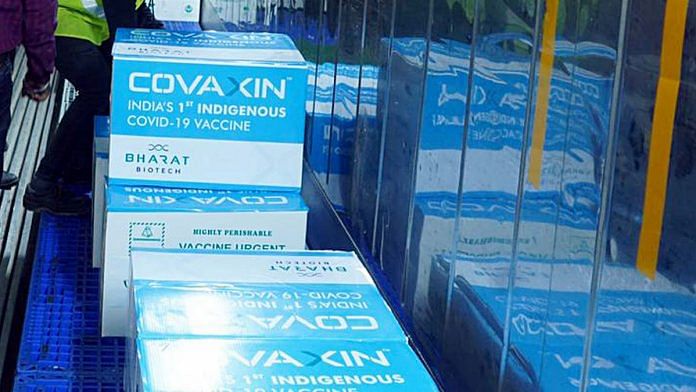New Delhi: India did not wait for the final efficacy data on Bharat Biotech’s Covaxin before using it in the Covid-19 vaccination drive, but there is no back-up plan on what action would be taken if it turns out to be less than the 50 per cent efficacy benchmark set by the World Health Organization, ThePrint has learnt.
The efficacy data on Covaxin is expected in the next one month, but there is no clarity on what would happen to people who have already received the first dose of the indigenous vaccine should the number not be up to the mark. Covaxin is a two-dose vaccine, with the second dose required to be given 28 days after the first one.
A senior health ministry official, when asked if people could then be given a different vaccine to ensure better protection in case of a low efficacy number, said on the condition of anonymity: “There is no such provision. It is totally unscientific to give one dose of a vaccine and then give another dose of a second vaccine. Nowhere in the world is this happening.”
Currently, vaccine beneficiaries cannot choose which vaccine to take, but can refuse consent to be administered Covaxin by simply foregoing their turn.
Vaccine efficacy is a measure of the quality of protection a vaccine offers — it is defined as the percentage reduction in disease incidence in a vaccinated group compared to an unvaccinated group.
In an article in The Lancet Infectious Diseases in October last year on what constitutes an efficacious vaccine, researchers from the University of Oxford pointed out: “In their target product profile for Covid-19 vaccines, WHO suggested that a ‘clear demonstration of efficacy (on a population basis) ideally with approximately 50 per cent point estimate’ should be a minimum criterion for any acceptable Covid-19 vaccine, and that efficacy can be assessed against ‘disease, severe disease, and/or shedding/transmission’ endpoints.”
Also read: Covaxin, Covishield not for everyone — manufacturers list who should avoid the Covid vaccines
Misgivings over Covaxin
While the response to India’s vaccination drive has been poor so far, it has been even worse for Bharat Biotech’s indigenously developed Covaxin.
Less than 50 per cent of healthcare workers who were supposed to receive the Covaxin shot in the first weekend of vaccination in New Delhi actually ended up taking it, according to data accessed by ThePrint.
In a letter to Karnataka Health Minister Dr K. Sudhakar on 18 January, the state’s Association of Resident Doctors took objection to being given Covaxin, and demanded that doctors be allowed to choose between Bharat Biotech’s shot and Covishield, manufactured by the Serum Institute of India.
The doctors wrote: “It is also a matter of great concern that government has decided to inject vaccine whose phase III results are yet to be declared. Though interim analysis report of Covishield is available, the same is not true in case of Covaxin. The resident doctors feel that they have been discriminated and gross injustice is caused to them, and also the government is erratic when it comes to the safety of doctors.”
Cabinet secy chairs meeting
On Thursday, Cabinet Secretary Rajiv Gauba chaired a meeting on the current status of Covid vaccinations, where the next phase of inoculation was also discussed. The next phase is supposed to target two crore people, including personnel from state and central police departments, armed forces, home guard and civil defence, including disaster management volunteers and municipal workers (excluding healthcare workers).
Later, Health Secretary Rajesh Bhushan met Defence Secretary Ajay Kumar to discuss vaccinations during the next phase. There is no clarity on when this phase will start.
In the third phase, about 27 crore people aged more than 50 years, as well as younger people with comorbidities, will be vaccinated. That is when Prime Minister Narendra Modi and those of his ministers who fulfil the criteria are expected to get vaccinated.
Health Minister Dr Harsh Vardhan also unveiled posters to address the issue of vaccine hesitancy in some sections of the population.
Also read: WhatsApp reminders, counselling, newspaper ads — how states are fighting vaccine hesitancy



